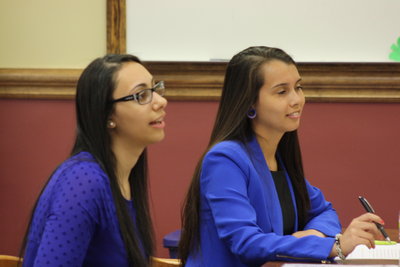The Anna J. Herbert meeting room at Bayonne High School became a courtroom for a day on March 18 as students gathered to reenact the case that allowed them to reach the regional Mock Trial Finals for the second time in three years. The mock trial is part of a tradition of successful debates that has allowed to Bayonne teams to dominate the competitions since they started in the 1980s. About 20 BHS students participated in this year’s competition, which, according to Martin Gurczeski, started the first week of the school year in September. “The kids knew that the case was released in last August and were anxious to read it and get ready,” he said. The trial revolves around a pet owner whose competition-winning dog had fleas, and after the owner gave the dog two different treatments, the dog has an allergic reaction and eventually dies. The owner is suing the manufacturer of the flea medication for damages. Mock Trial is a competition that is run by the New Jersey State Bar Foundation and is organized on the county level by the Hudson County Bar Association. With a majority of the students from this year’s team graduating in June, Gurczeski thought it would be a good idea to record the trial so that future teams could study it in detail when getting ready for their own competitions. “We began working on the case in September every Saturday morning from 9 a.m. to 1 p.m.,” he said. Gurczeski attributed a lot of the success of the team to its coach, Randy Grossman. “He understands the protocol better than anybody in terms of where the kids need to stand and the proper procedures in terms of approaching witnesses,” he said. “A lot of schools are very scripted and basically go off the paperwork that is given to us. Our students study the characters and know the case inside and out. They just have fun with it.” The judges of the competition are real judges and lawyers from the county bar association. “So the students are getting real feedback from real judges both on the municipal and county level, and from lawyers as well,” he said. What kinds of students get involved in this? “A lot of times there are students who are looking for careers in legal careers. Sometimes it’s just kids that enjoy hanging out on a Saturday morning at the ice rink,” he said. The students vary in age and are in grades nine through 12. “Unfortunately, we are losing a majority of the team,” he said. “We’re recording the case this year so they can see it next year. Some of our seniors will be in contact and we have a good group coming back next year – five or six of them.” On average, the group has about 20 students, but the team only needs 10 people for the competition. There are always backups for the witnesses. Sometimes they have replacements for main characters. Each year the case alternates between criminal and civil. “This is so that the kids get a good understanding of the differences between the types of cases,” he said. Usually the competitions take place at the Brennan Courthouse, but over the last two years, because of ongoing renovations there, the competitions were conducted in the newer courthouse next door on Newark Avenue in Jersey City. Competition began on Jan. 28 with the team from Weehawken facing off against St. Dominick’s Academy. Bayonne advanced to the quarterfinals, where they faced Union City High School. Later in the finals they competed against McNair Academic High School. In a back-and-forth fight, Bayonne High School emerged victorious and moved onto the North Regional Quarterfinals, where they lost in a tight match against the winning team from Bergen County.
“I got really interested in it. I went and had a great time, and really enjoyed it.” – Sara Boutrs
__________
